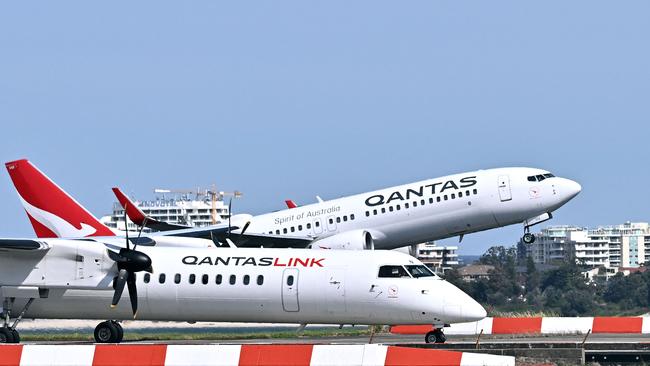ACCC releases details of Qantas ghost flights as engineers strike
In a statement of facts revealed by the ACCC over the Qantas ghost flight scandal, the airline admits senior executives knew it was selling cancelled flights.

Qantas senior executives knew the airline was selling tickets for flights it had cancelled, according to a statement of facts released by the Australian Competition & Consumer Commission about the “ghost flights” scandal that the airline paid $120m to settle in May.
The news comes as engineers at the airline start strike action as they fight for higher wages, following the airline’s announcement of up to 30 per cent pay hikes for flight attendants and short haul pilots and just after the airline has posted its second highest profit on record.
The statement of agreed facts still needs to be approved by the Federal Court, and is due to be heard on October 8.
Qantas admitted it had engaged in misleading or deceptive behaviour by continuing to sell airfares for flights it knew it would not be operating.
Under the headline “knowledge of senior managers,” the ACCC revealed for the first time the details of what exactly senior management knew.
“Senior managers responsible for different aspects of Qantas’ systems and operations knew: That flights the subject of a cancellation decision were not immediately removed from sale; that some consumers could and did make bookings on flights after those flights had been the subject of a cancellation decision; that consumers who had made bookings on flights that were the subject of a cancellation decision were not notified of that decision immediately,” the ACCC said.
Senior management also knew that “the Manage Booking Pages for flights that were the subject of a cancellation decision were not updated to reflect that decision promptly, although no single person knew all these matters.”
The ACCC acknowledged that Qantas had made changes to ensure these problems don’t happen again.
Under the old regime, flights that were cancelled were manually closed off. This process has now been automated.
The ACCC documents state that the Automated Closure Solution was not part of the original design for the improved in-house revenue management project.
As part of the proceedings, Qantas has admitted that 86,597 consumers made bookings on, or were re-accommodated to, some of those flights after Qantas had decided to cancel the relevant flight.
Qantas has admitted it engaged in the delayed notification from May 21, 2021 until August 26, 2023, which affected 60,297 flights (57,274 domestic/trans-Tasman and 3023 international).
The total amount paid by consumers in relation to those tickets was $170.9m. On average it took 11 days for consumers who had purchased tickets on these flights to be notified they had been cancelled, and in some cases, up to 67 days.
Since starting as chief executive less than a year ago, Vanessa Hudson has been taking steps to improve Qantas’s relationship with customers, politicians, and workers.
Her predecessor Alan Joyce left his role slightly earlier than originally planned as pressure mounted over the ghost flights scandal and the difficulty passengers had redeeming flights that had been cancelled, and after the airline was found to have illegally fired 1500 baggage handlers.
Ms Hudson agreed to settle the ACCC claim to avoid a court case and has implemented a number of key steps to improve customer satisfaction, such as expanding its seats available under its frequent flyer program and investing in customer service.
In the past month she has reached draft agreements with flight attendants and pilots over pay, which will increase by as much as 30 per cent in line with Same Job Same Pay legislation.
Originally published as ACCC releases details of Qantas ghost flights as engineers strike




